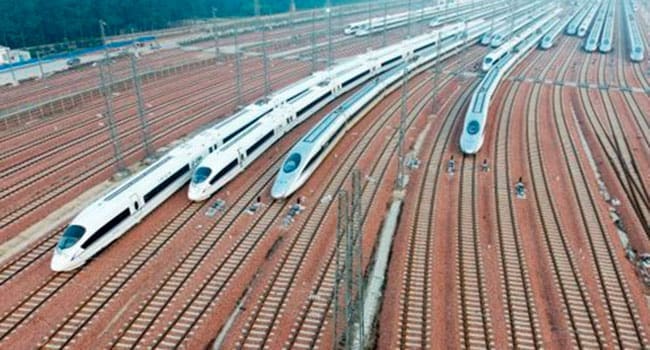 As members of a developed western economy, Canadians think we know all about capitalism. And, obviously, we believe our way of doing things is the best – we have nothing to learn from countries like China.
As members of a developed western economy, Canadians think we know all about capitalism. And, obviously, we believe our way of doing things is the best – we have nothing to learn from countries like China.
Or do we?
How did a country with an emerging economy like China build 20,000 km of high-speed rail infrastructure without raising taxes or becoming indebted to international bond markets?
China does things like fund infrastructure better than we do. We could learn from China’s unique sovereign money system and save ourselves a fortune on infrastructure.
Over the coming decade, the Canadian government will spend over $125 billion of taxpayers’ money rebuilding Canada’s aging physical infrastructure.
The plan will target three major areas: public transit; social, including affordable housing, seniors facilities, cultural and recreational facilities; and green, to reduce greenhouse gases and to prepare for increased flooding, wildfires and other destructive climatic effects.
This represents the largest investment in infrastructure in Canadian history.
Given the state of Canada’s public finances, how is the government going to fund this massive investment?
The government plans to establish the Canada Infrastructure Bank (CIB). This publicly-owned institution would use the federal government’s strong credit rating and lending authority to backstop projects. The idea is to make infrastructure projects more attractive to private-sector lenders.
How very Canadian. The public takes the credit risk and assumes the debt obligations while private investors reap windfall profits on infrastructure. Meanwhile, our national debt/gross domestic product ratio continues to worsen.
What would the Chinese do?
China has managed to avoid establishing a fully privatized debt money system, a fatal flaw that has plagued all western monetary systems for centuries.
Pre-1978 China operated a Soviet-style mono-banking system that was 100 per cent owned by the state. Needless to say, communist China didn’t attach a debt and interest burden on money creation. With the shift to market socialism, China continued to maintain state ownership over its central bank, the People’s Bank of China (PBC). In addition, China owns large majority shares in its commercial banks. Although principal and interest are now attached to Chinese loans, much of the principal and interest belongs to the state.
With a state-owned central banking system, China can create monetary reserves at will. The state can then direct these reserves to commercial banks that make loans secured against the new assets to fund infrastructure on a fractional reserve basis. (For every dollar created, the bank can create new money to lend for projects, up to 10 times their reserves.)
In theory, these loans need to be paid back with interest. In practice, because the original resources are created by the PBC (at no cost), and the government essentially owns the principal and interest, these loans are regularly rolled over indefinitely or written off when they become inconvenient.
So China uses the monetary power of its state to fund infrastructure at no cost to the taxpayer.
Could Canada do the same?
Thanks to CIB, we could develop a variation that would help modernize our aging infrastructure and vastly reduce the financial burden on taxpayers.
The government could take CIB one step further and establish it as a charted depository bank.
Chartered banks can create new money, CIB can’t. Contrary to popular belief, money isn’t static, it’s elastic and chartered banks create new money (money that didn’t exist before) every time they write a mortgage or make a loan.
CIB will be used to increase the credit worthiness of municipal or provincial infrastructure projects. This means private banks will generate (without effort or risk) new money to fund these projects and, naturally, will demand the principal and interest be repaid from taxpayers for generations to come. It’s called debt slavery.
It’s no coincidence that the most successful western developed economies are the deepest in debt. Debt crises are built into our deeply-flawed privatized monetary system.
Canada, like many western nations, is at a financial tipping point. We are slowly drowning in debt.
We’ll either learn a thing or two from countries like China, or continue to drive our economies deeper into debt. If we can overcome our cultural arrogance and hubris, it’s a simple choice.
Robert McGarvey is an economic historian and former managing director of Merlin Consulting, a London, U.K.-based consulting firm. Robert’s most recent book is Futuromics: A Guide to Thriving in Capitalism’s Third Wave.
Robert is a Troy Media Thought Leader. Why aren’t you?
The views, opinions and positions expressed by columnists and contributors are the author’s alone. They do not inherently or expressly reflect the views, opinions and/or positions of our publication.

